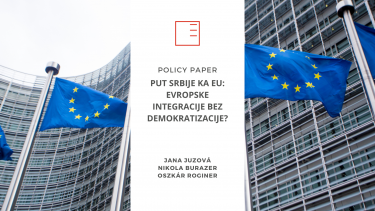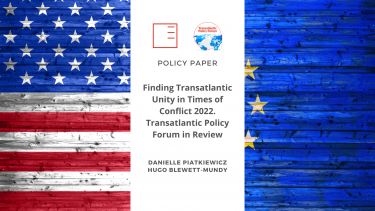POLICY PAPER | The lingering war in Ukraine: Security implications in Europe
Orsolya Ráczová writes that it is difficult to predict the long-term effects of war with certainty, yet it is essential to be aware of the fact that the longer a war continues, the more dire its long-term impact becomes. The era of relative peace and stability in Europe is over, security should no longer be taken for granted. Europe needs to rethink its security at EU, NATO and Member State level. It is also essential to strike the right balance to ensure security at home while providing much-needed support to Ukraine.
Show morePOLICY PAPER | Přetrvávající válka na Ukrajině: Bezpečnostní důsledky pro Evropu
Orsolya Ráczová píše o tom, že je obtížné s jistotou předpovědět dlouhodobé dopady války, přesto je nezbytné uvědomit si skutečnost, že čím déle válka pokračuje, tím je její dlouhodobý dopad hrozivější. Éra relativního míru a stability v Evropě skončila, bezpečnost by již neměla být považována za samozřejmost. Evropa musí přehodnotit svou bezpečnost na úrovni EU, NATO i členských států. Je rovněž nezbytné najít správnou rovnováhu k zajištění bezpečnosti doma a současně k poskytování tolik potřebné podpory Ukrajině.
Show moreEU MONITOR | THREE RESPONSES TO DISINFORMATION IN THE EUROPEAN UNION
Disinformation and foreign interference have been concerns in global politics for centuries, but social media algorithms have made the current threat more dire as they amplify content based on human frailties such as our obsession with negativity and outrage. Russian interference in the 2016 US federal election and other elections and referenda in at least twenty countries between November 2016 and April 2019, including the Brexit referendum, the French and German elections, and the Ukrainian power grid cyber-attacks, have highlighted the potential for foreign governments to alter the results of an election or undermine democracies using social media and other means. Writes Jakub Ferenčík in his last EU MONITOR.
Show more PDF
Policy Paper | PUT SRBIJE KA EU: EVROPSKE INTEGRACIJE BEZ DEMOKRATIZACIJE?
Is Serbia succeeding in meeting the conditions for EU accession? Read the Policy Paper co-written by Jana Juzová, Nikola Burazer and Oszkár Roginer on Serbia's path to EU membership. The policy paper is written in Serbian.
Show more PDF
Policy Paper | PUT SRBIJE KA EU: EVROPSKE INTEGRACIJE BEZ DEMOKRATIZACIJE?
Daří se Srbsku plnit podmínky nutné k přistoupení do EU? Přečtěte si Policy Paper, který dohromady napsali Jana Juzová, Nikola Burazer a Oszkár Roginer, ve kterém se věnují srbské cestě ke členství v Evropské unie. Policy paper je psaný v srbštině.
Show more PDF
POLICY PAPER: Finding Transatlantic Unity in Times of Conflict 2022. Transatlantic Policy Forum in Review
Our researchers Danielle Piatkiewicz and Hugo Blewet-Mundy have written a policy paper on "Finding Transatlantic Unity in Times of Conflict 2022. Transatlantic Policy Forum in Review" which aims to outline action points and proposals that the Transatlantic Partnership should adopt.
Show more PDFPOLICY PAPER | Hledání transatlantické jednoty v době konfliktu 2022. Přehled transatlantického politického fóra
Naše výzkumná pracovnice Danielle Piatkiewicz a Hugo Blewet-Mundy napsali policy paper na téma "Finding Transatlantic Unity in Times of Conflict 2022. Transatlantic Policy Forum in Review", který má za cíl nastínit akční body a návrhy, které by mělo transatlantické partnerství přijmout.
Show more PDFPOLICY PAPER | QMV in CFSP: Impending necessity or resurfacing utopia?
Miroslava Pisklová writes about a discussion on potential broadening of the qualified majority voting (QMV) system to more of the remaining policy areas in the Council of the EU in which it is not yet used, namely the EU´s Common Foreign and Security Policy (CFSP) that has recently gained momentum. This publication aims to analyse the advantages and disadvantages of introduction of the QMV in CFSP of the EU with a focus on the potential impact on smaller member states.
Show morePOLICY PAPER | Kvalifikovaná většina ve Společné zahraniční a bezpečnostní politice: Blížící se nutnost nebo znovu objevená utopie?
Miroslava Pisklová píše o diskusi o možném rozšíření systému hlasování kvalifikovanou většinou (QMV) na více zbývajících oblastí politiky v Radě EU, v nichž se dosud nepoužívá, konkrétně na společnou zahraniční a bezpečnostní politiku EU (SZBP), která v poslední době nabírá na síle. Cílem této publikace je analyzovat výhody a nevýhody zavedení QMV v SZBP EU se zaměřením na možný dopad na menší členské státy.
Show morePOLICY PAPER | Shifting the gender quota debate from underrepresentation of women to overrepresentation of men within diplomacy
Ivana Uličná writes about the fact that even though some progress has been made towards gender equality in diplomacy, women remain underrepresented in ambassadorial positions worldwide. Quotas have been effective in boosting nominal representation of women but critiques focused on quotas being tokenistic and harming meritocracy place a double burden on women. However, even the current system is not meritocratic, as men benefit from a historical advantage and assumed competence, while women must justify their presence, prove their worth and disprove gender stereotypes.
Show moreStaroměstské náměstí 4/1
Prague 1 - Staré Město
110 00
tel.: +420 212 246 552
email: europeum@europeum.org
https://www.europeum.org






